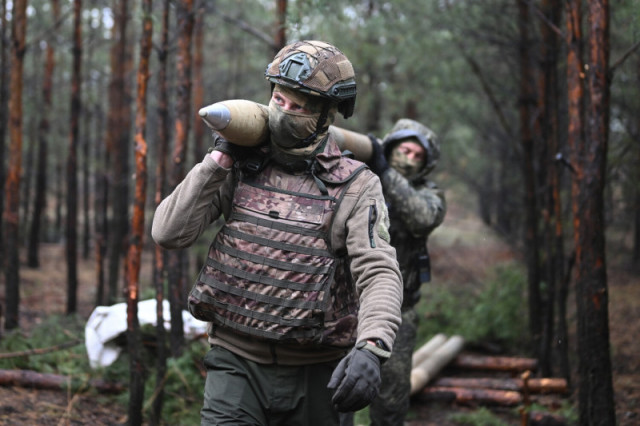Military observer of the Newspaper.En" Mikhail Khodarenok visited the Ogarkov Readings - 2023 conference, dedicated to the development of military technologies and their impact on the conduct of hostilities, and tells what was said there about the life of soldiers and commanders participating in Russia's special military operation in Ukraine.

(c) Stanislav Krasilnikov / RIA Novosti
Without fire, under continuous rain
Participants of military operations on the fronts of the SVO told about their life on the front line within the framework of the Ogarkov Readings conference, held in Moscow on October 31.
According to them, in Southern Ukraine from October to April there is almost continuous rain (or rain with snow, or snow with rain).
For these reasons, the soldiers in the trenches around the clock, for long weeks from head to toe wet, and wet through. Sleeping bags don't really help in this case either - they also get wet. And there is no way to dry off. It is impossible to build a fire in the conditions of the front edge (the defensive area closest to the enemy front), especially at night. It is immediately opened by the enemy and in the very near future at least a few 120, 82 or 60 mm caliber mines will arrive at the campfire (and the fighters around it) (the latter is a purely NATO caliber).
At the forefront, you can't even boil a mug of tea. Firstly, the fire from even a few splinters will be noticed by the enemy's thermal imagers, and secondly, tablets of dry alcohol, which are part of the daily ration of an ordinary fighter, only heat up the water in the mug, but by no means lead to boiling.
Ubiquitous dirt
One of the main problems the participants of the SVO called dirt.
Ukrainian dirt - the so-called mulyaka - is almost everywhere. She climbs into the berets, by the sleeves, by the collar. It is no exaggeration to sleep in this mud, eat in it. The landscape at the forefront is mostly shell craters and mud. The terrain on which fighting is taking place for the most part in Ukraine is agricultural land, that is, squares with sides measuring 5 km, bordered by forest belts (plantings). Being in open areas of such terrain is dangerous for life. You can hide and equip defensive structures only in landings.
It is almost impossible to dig trenches of a full profile and dugouts (dugouts) to shelter personnel in the conditions of mulyaka. The newly opened cells and crevices are almost immediately filled with dirty slime. You can only dig out a kind of fox holes, in which the soldiers and commanders on the front line have to hide from small arms fire, fire raids, finally sleep, and just live.
The tree plantations that make up the Ukrainian forest belts are practically unsuitable for the construction of overlappings of dugouts and dugouts (there are no "our dugouts in three rolls", as it is sung in the famous song, you can't build from them). In addition, any activity for the construction of such shelters is almost immediately opened by the enemy and becomes an object for a fire strike.
APU drones in the sky and monotonous food
Unmanned aerial vehicles of the enemy continuously hang over the front edge (and out of the range of our anti-drone guns and out of the reach of small arms fire of the fighters of the Armed Forces of the Russian Federation).
The APU perfectly sees what is being done on the line of combat contact (front-line soldiers for some reason do not like this term and prefer to say - the leading edge) and even far beyond it.
Any movement of groups of fighters, starting with two or three soldiers, causes an immediate fire impact of the enemy. Moreover, the APU is very well equipped with all means of reconnaissance and surveillance, including night vision devices of all possible types.
For example, in order to replenish food and ammunition supplies from the unit, two or three fighters are sent to the drop point (where the material is unloaded) on a dark night. They don't even use flashlights when moving. Otherwise, the group will be immediately detected and fired upon. Ammunition and food are brought to the front edge not by three-axle all-terrain vehicles, but in many cases by pickups. Having received the material means, the group usually goes back in complete darkness.
There is more than enough food on the front line. But fighters and commanders are tired of its monotony. If you eat dry rations, and he, by and large, is of very good quality, but do it for long weeks, then you inevitably get tired of buckwheat / rice porridge and stew.
Higher-ranking commanders are aware of all these problems and are doing everything possible to improve the life of fighters on the front line. But you can't change a lot by definition. Nothing, for example, can be done with the terrain and the dummy. One of the possible ways out in this situation is to withdraw units and units to the rear more often for rest and restoration of combat capability. In the end, people just need to dry off, wash and shave. And eat hot soup.
The sixth annual conference "Ogarkov Readings - 2023", organized by the Center for Analysis of Strategies and Technologies (CAST), was held on October 31, 2023 in Moscow. The conference is dedicated to the memory of the bright Russian military thinker of the second half of the XX century, Chief of the General Staff of the Armed Forces of the USSR (1977-1984) Marshal Nikolai Ogarkov.

